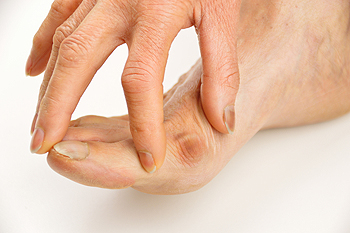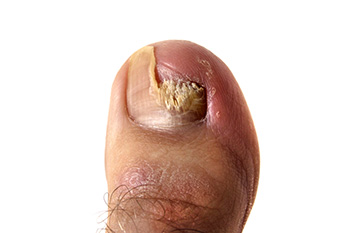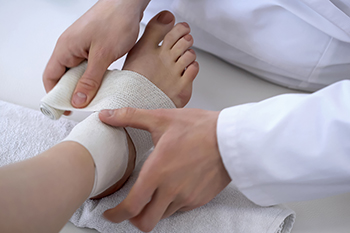Items filtered by date: July 2023
Fall Prevention in the Home and Workplace

Falling is dangerous in many ways. It can invoke a fear of falling, causing the inability to complete daily activities. Additionally, many foot injuries can happen as a result of falling, and this can happen in the home or workplace. The majority of falls can be prevented by implementing simple methods that can make the home and working environment safer. Many people at work have to use ladders for various reasons, and it is important the ladder is on stable ground. Additionally, a locking device can secure the ladder, and wearing slip-resistant shoes while climbing the ladder may help to prevent falling. Removing worn rugs from the living environment and clearing clutter from walkways can help to keep the home safe from falling. Many people install grab bars in the shower and toilet area, which can provide security while in these rooms. If you would like information about how falling can affect the feet, it is suggested that you speak with a podiatrist who can provide you with prevention techniques.
Preventing falls among the elderly is very important. If you are older and have fallen or fear that you are prone to falling, consult with the foot specialists from Podiatry Associates of Belleville. Our doctors will assess your condition and provide you with quality advice and care.
Every 11 seconds, an elderly American is being treated in an emergency room for a fall related injury. Falls are the leading cause of head and hip injuries for those 65 and older. Due to decreases in strength, balance, senses, and lack of awareness, elderly persons are very susceptible to falling. Thankfully, there are a number of things older persons can do to prevent falls.
How to Prevent Falls
Some effective methods that older persons can do to prevent falls include:
- Enrolling in strength and balance exercise program to increase balance and strength
- Periodically having your sight and hearing checked
- Discuss any medications you have with a doctor to see if it increases the risk of falling
- Clearing the house of falling hazards and installing devices like grab bars and railings
- Utilizing a walker or cane
- Wearing shoes that provide good support and cushioning
- Talking to family members about falling and increasing awareness
Falling can be a traumatic and embarrassing experience for elderly persons; this can make them less willing to leave the house, and less willing to talk to someone about their fears of falling. Doing such things, however, will increase the likelihood of tripping or losing one’s balance. Knowing the causes of falling and how to prevent them is the best way to mitigate the risk of serious injury.
If you have any questions, please feel free to contact our office located in Belleville, NJ . We offer the newest diagnostic and treatment technologies for all your foot care needs.
Why Do Bunions Develop?

A bunion is a bone disorder that is on the side of the big toe, and it will gradually become larger if treatment is not received. Bunions can develop as a result of wearing shoes that do not have enough room in the toe area to move freely in. Severe bunions may cause the other toes to shift together and larger shoes may need to be purchased. Some people are born with an abnormal foot structure causing the feet to be out of alignment. This may affect the metatarsophalangeal joint, possibly causing a bunion to form. Overpronation, or the amount the foot rolls inward while walking, may lead to a bunion developing. Additionally, people who have flat feet may have bunions, and wearing orthotics may help to stabilize the arch of the foot. A protective pad can be worn over the bunion to help prevent corns from developing on top of it. This can happen as the top of the bunion rubs against the shoe, causing pain and discomfort. If you have a bunion, it is strongly suggested that you are under the care of a podiatrist who can help you with permanent relief options.
If you are suffering from bunion pain, contact the foot specialists of Podiatry Associates of Belleville. Our doctors can provide the care you need to keep you pain-free and on your feet.
What Is a Bunion?
Bunions are painful bony bumps that usually develop on the inside of the foot at the joint of the big toe. As the deformity increases over time, it may become painful to walk and wear shoes. Women are more likely to exacerbate existing bunions since they often wear tight, narrow shoes that shift their toes together. Bunion pain can be relieved by wearing wider shoes with enough room for the toes.
Causes
- Genetics – some people inherit feet that are more prone to bunion development
- Inflammatory Conditions - rheumatoid arthritis and polio may cause bunion development
Symptoms
- Redness and inflammation
- Pain and tenderness
- Callus or corns on the bump
- Restricted motion in the big toe
In order to diagnose your bunion, your podiatrist may ask about your medical history, symptoms, and general health. Your doctor might also order an x-ray to take a closer look at your feet. Nonsurgical treatment options include orthotics, padding, icing, changes in footwear, and medication. If nonsurgical treatments don’t alleviate your bunion pain, surgery may be necessary.
If you have any questions, please feel free to contact our office located in Belleville, NJ . We offer the newest diagnostic and treatment technologies for all your foot care needs.
Types of Toenail Fungus

Fungus can affect the nails and is more apt to develop on the toenails as a result of warm and moist environments the feet can be in. It is an unsightly nail infection, and many people seek relief options to improve the appearance of their toenails. Common symptoms that are associated with toenail fungus can include brittle, thickened nails, and in severe cases, the nails may fall off. The most common type of toenail fungus is referred to as tinea unguium. The infection typically begins under the nail and gradually spreads until medical treatment is sought. White superficial onychomycosis is a nail fungal infection that is found in the top layer of the nail. This may be easier to treat than other types of toenail fungus. If you notice a change in your toenails, it is suggested that you contact a podiatrist who can effectively diagnose and offer treatment options for toenail fungus.
For more information about treatment, contact the foot specialists of Podiatry Associates of Belleville. Our doctors can provide the care you need to keep you pain-free and on your feet.
Toenail Fungus Treatment
Toenail fungus is a condition that affects many people and can be especially hard to get rid of. Fortunately, there are several methods to go about treating and avoiding it.
Antifungals & Deterrence
Oral antifungal medicine has been shown to be effective in many cases. It is important to consult with a podiatrist to determine the proper regiment for you, or potentially explore other options.
Applying foot powder on the feet and shoes helps keep the feet free of moisture and sweat.
Sandals or open toed shoes – Wearing these will allow air movement and help keep feet dry. They also expose your feet to light, which fungus cannot tolerate. Socks with moisture wicking material also help as well.
If you have any questions please feel free to contact our office located in Belleville, NJ . We offer the newest diagnostic tools and technology to treat your foot and ankle needs.
Causes and Treatments of Ankle Sprains

There are some people who roll their ankle, and refer to it as an ankle sprain. It is considered to be one of the most common injuries among people who participate in sporting activities, and affects the ligaments in the ankle. It can also happen from unexpectedly stepping off of a curb, where the ankle can suddenly twist. A diagnosis is often performed, which consists of having an X-ray taken. This is generally successful in confirming the sprain and ruling out a fractured foot. Treatment can begin with resting the affected foot as often as possible, and elevating it may help to reduce existing swelling. It is beneficial to keep weight off of the foot, and wearing a protective boot or using crutches may help with mobility. Relief may be found when the ankle is wrapped in an elastic bandage, which can provide the necessary support as the healing process occurs. If you have sprained your ankle, it is suggested that you confer with a podiatrist who can accurately diagnose it, and offer relief and treatment solutions.
Ankle sprains are common but need immediate attention. If you need your feet checked, contact the foot specialists from Podiatry Associates of Belleville. Our doctors can provide the care you need to keep you pain-free and on your feet.
How Does an Ankle Sprain Occur?
Ankle sprains take place when the ligaments in your ankle are torn or stretched beyond their limits. There are multiple ways that the ankle can become injured, including twisting or rolling over onto your ankle, putting undue stress on it, or causing trauma to the ankle itself.
What Are the Symptoms?
- Mild to moderate bruising
- Limited mobility
- Swelling
- Discoloration of the skin (depending on severity)
Preventing a Sprain
- Wearing appropriate shoes for the occasion
- Stretching before exercises and sports
- Knowing your limits
Treatment of a Sprain
Treatment of a sprain depends on the severity. Many times, people are told to rest and remain off their feet completely, while others are given an air cast. If the sprain is very severe, surgery may be required.
If you have suffered an ankle sprain previously, you may want to consider additional support such as a brace and regular exercises to strengthen the ankle.
If you have any questions please feel free to contact our office located in Belleville, NJ . We offer the newest diagnostic and treatment technologies for all your foot and ankle needs.
